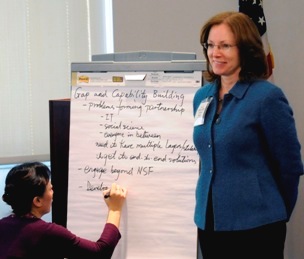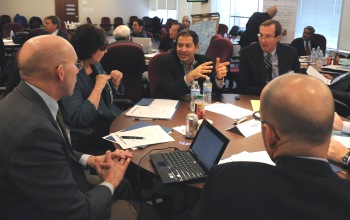CTG, National Association of State Chief Information Officers Collaborate on Agenda-setting Technology Workshop
 |
Theresa Pardo, CTG Director, facilitates a discussion among the workshop participants while Jing Zhang, Assistant Professor of Management at Clark University and a UAlbany alumna, records their responses. |
The University at Albany's Center for Technology in Government (CTG) led the organizing effort for a two-day workshop that brought together leading social and information scientists and government practitioners to lay out a research agenda to address grand challenges in information, technology, and governance.
The National Association of State Chief Information Officers (NASCIO) co-sponsored the workshop with the National Science Foundation (NSF) to launch a new multi-sector conversation about the way technology and social forces shape the workings of government. The workshop, which was held at the NSF, included 40 representatives from throughout the country.
"The workshop brought together a diverse community of research and practice professionals to focus on the interaction between context and technology and to develop new interdisciplinary and multi-sector approaches to examining these interactions," said Theresa Pardo, director of CTG.
"Fifteen years after the appearance of the Web and the Internet, government is engaged in the use of new information technologies as key to fulfilling their missions; society is demanding an efficient and responsive government," said Lawrence Brandt, former program officer for the NSF Digital Government Program, now with the National Coordination Office for Networking and Information Technology Research and Development. "The seamless and trustworthy eGovernment we all want requires the collaboration of the public and private sectors, married to the innovation of universities and laboratories. The goal is speedy transition from lab to product, but to do this we must take a fresh look at the amount of federal research dollars available for this work and potentially implement alternative funding models."
 |
L-R: Bill Schrier, Chief Technology Officer for the City of Seattle; Sharon Dawes, Senior Fellow, CTG; Noshir Contractor, Jane S. & William J. White Professor of Behavioral Sciences at Northwestern University; Jonathan Breul, Executive Director, IBM Center for the Business of Government. |
The workshop focused on:
- Understanding the multiple contexts in which government and governance operate and how those contexts matter in technology adoption, use, and impact.
- Leveraging the knowledge and expertise of the workshop participants about how value, risks, and complexity are understood and addressed by government decision makers and managers.
- Recommending research themes, designs, and funding criteria for future work that will have both scholarly and practical value.
"Advances in technology, together with the significant role new technologies are playing in government and society, demand a fresh consideration of a digital government research agenda and of the mechanisms in place to support it," said H. Jochen Scholl, associate professor at the University of Washington, and president of the Digital Government Society of North America.
"This was an important event where government researchers and practitioners pushed the boundaries of their collective understanding, laying the groundwork for more practice-oriented research," said Douglas Robinson, executive director of NASCIO.
A full workshop report is due by summer 2010.
![]() For more news, subscribe to UAlbany's RSS headline feeds
For more news, subscribe to UAlbany's RSS headline feeds


